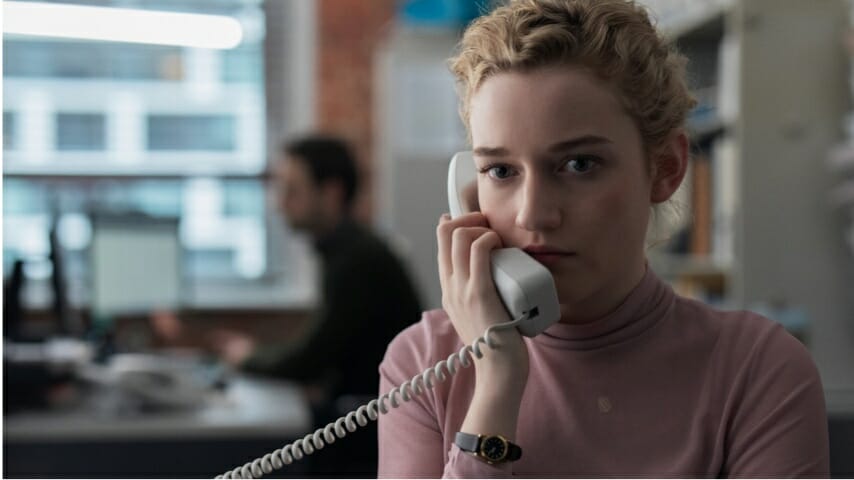Kitty Green Discusses Complicity and Loneliness in The Assistant

In Kitty Green’s The Assistant, Jane (Julia Garner), works for an unidentified and breathtakingly heinous movie mogul: He’s so venomous, so malicious, so abusive, and so lascivious that the film earned the distinction of “the Harvey Weinstein picture” immediately on its release. He uses his power to coax young women into bed (or onto the casting couch) with him, and woe betide the employee who displeases him. The man is a monster, and Green never shows the audience his face, so it fits that critics would jump to the Weinstein comparison as the best (the worst) frame of reference we have.
But of course, Weinstein isn’t the only predator stalking the movie industry, and that’s part of what drives The Assistant forward. Green isn’t interested in turning Hollywood’s problem with sexual assault and gender inequity into Weinstein’s alone. There are other men out there guilty of the same offenses, and treating The Assistant as only a Weinstein parable gives those men an accidental pass. There’s more to what Jane sees and experiences than that.
So when Paste sat down to talk with Green about her work, we drilled down and talked about the far-reaching implications of the behavior Weinstein exhibits and which pervades so many corners of the filmmaking world.
Paste Magazine: What do you think the limitations are that are imposed on art when art is about something like what The Assistant is about, but tied to something literal, a literal world event? If this was actually about Harvey Weinstein, how would that hinder the movie?
Kitty Green: Yeah. I don’t think it would hinder the movie so much. It probably would be a similar film if I’m making it. [laughs]
I would say it’s reductive to me to say that it’s a Harvey Weinstein problem. I feel like the biggest thing is, people would come out of it and go, “Oh, that was a problem at The Weinstein company, and not more of a global issue.” They’d be looking at him as opposed to the systemic and cultural problems, which is what I’m trying to highlight through these tiny examples of microaggressions that are symbolic of these larger systems of power that keep men in power, and keep women out of it. It would hurt the movie, I guess, or at least it would be easy for people to walk out of it and go, “Oh, well that’s not us.” Whereas the way we’ve done it now really implicates everybody. It makes us all feel complicit, and that was what I was ultimately trying to get at.
Paste: I felt a little bit of that myself. To talk to you now, I feel a little bit more of that. You’re right to say that it’s reductive to see this as, maybe not the Harvey Weinstein movie, but a Weinstein movie. Do you suppose that that’s maybe why this is a sharper way to approach subjects like this, by being less specific?
Green: I think we’re being very specific, even though we’re not specific. Do you know what I mean?
Paste: Yeah, the movie is about a very specific problem.
Green: But also about very specific details, too. That’s why I think they would be similar movies, but I think people’s perception of them would change. It would alter the way people are viewing what they’re seeing as opposed to actually altering the film itself. This way, we get more conversations about how to make our workplaces safer and more fair and equitable. The other way it would just be like, “Eh, well.”
Paste: “Weinstein was a bad guy!”
Green: “We fixed that problem!” Yeah, exactly.
Paste: This way, the audience isn’t let off the hook. To hear you speak that sounds really important, the element of not letting people off the hook, even the people who you want to come see the movie.
Green: It’s funny. I keep getting questions about the ending, and people worrying it’s bleak, and it doesn’t have that uplifting message that they were hoping for.
-

-

-

-

-

-

-

-

-

-

-

-

-

-

-

-

-

-

-

-

-

-

-

-

-

-

-

-

-

-

-

-

-

-

-

-

-

-

-

-








































